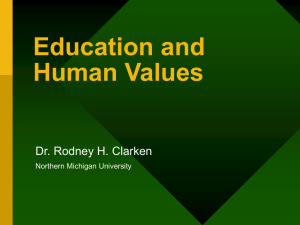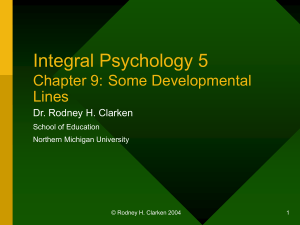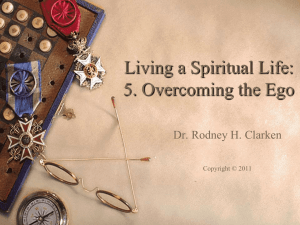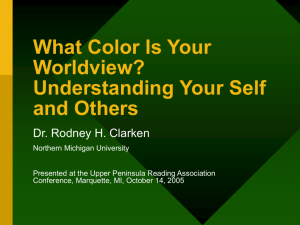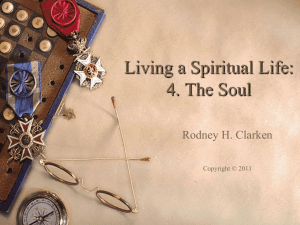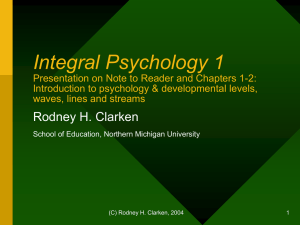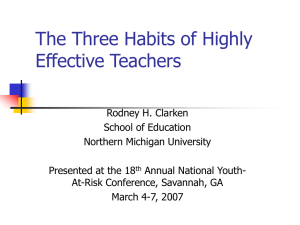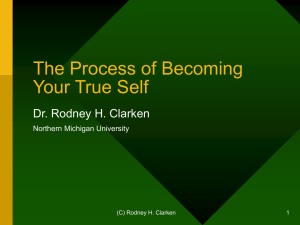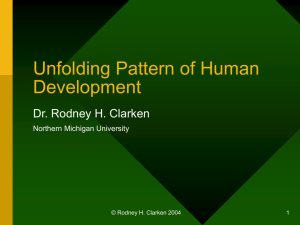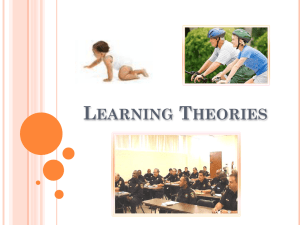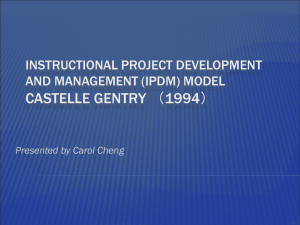Curriculum Development and Instructional Design
advertisement
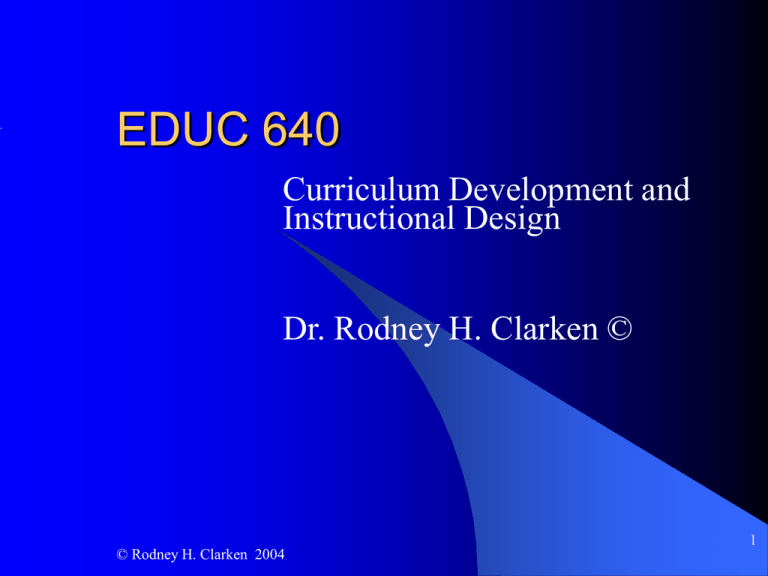
EDUC 640 Curriculum Development and Instructional Design Dr. Rodney H. Clarken © 1 © Rodney H. Clarken 2004 Introduction of course This course introduces students to the fundamentals of – – – – Curriculum development Instructional design Theories of learning Systematic frameworks for training activities July 14-18, 2003, 9:00-12:30, 2:00-5:30, Seminar presentation Monday July 14, 7:30-9:00 pm. 2 © Rodney H. Clarken 2004 EDUC 640 Curriculum Development & Instructional Design (CRES Institutional II) The purpose of this section is to offer a graduate level course of study on curriculum development and instructional design. It is an inquiry into major theories of curriculum and emerging areas in curriculum development with references to the application of curriculum planning to instruction, issues involved in designing instruction and assessment, and the cultivation of moral values as a basis for reinventing curriculum. 3 © Rodney H. Clarken 2004 Furthermore, the idea of curriculum development as an organic process intimately linked with the whole culture will be examined. Curriculum theory, its epistemological aspects, and its relationships with the scheme of the sciences will be explored. Theories of learning & instruction and issues related to curriculum improvement and evaluation will be discussed as well. There will be special emphasis on curricular approaches that promote the unity of learning and harmony between science and the humanities and the social sciences. Aspects of critical thinking will also be examined. 4 © Rodney H. Clarken 2004 Introduction of Dr. Clarken – Experience: Professor, Director, Dean, Consultant, Teacher, Curriculum and Instruction Development – Education: Ph.D. Administration and Supervision; M.A. General and Experimental Psychology; M.S.T. Elementary Education; B.S. Elementary Education; A.A. Liberal Arts – Background: Iowa farm boy, Bahá'í, teacher, born ’51; value unity, knowledge, justice, effort, service and character 5 © Rodney H. Clarken 2004 What is the relevant background and interests of the students? Education Experience Interests 6 © Rodney H. Clarken 2004 What do we know already about the topic? KWL process – What you know-V-8 yrs teaching; S-internal training, M-2 yrs sub HS, after school, curr. dev.; F-develop curr for civil engineering for Belize U, HS science teacher 1 yr. – What you want to know-efficiency, why, what is the learning process, combine science with values, cultural differences, relevance, empowering, motivation, vision, agency, – What you have learned 7 © Rodney H. Clarken 2004 Why are you taking this course? Get the credits for program Able to apply the knowledge Integrate ethics and knowledge Cohesive whole 8 © Rodney H. Clarken 2004 What are the students goals? What do the students hope to do with the knowledge, skills and attitudes acquired in this course? – – – – – – Training, concrete methods, evaluation, Develop or assist others to develop curriculum Violence prevention, virtues and EFP To be better teacher To be a better individual To develop potential in ourselves and others 9 © Rodney H. Clarken 2004 How do you best learn? How can I as the course instructor help you? lectures, combined with practice, how to implement, How can your fellow students help you? What class guidelines and structures will facilitate our learning process? 10 © Rodney H. Clarken 2004 How can we best achieve our goals? Reading Discussion Projects Consultation Portfolios Designing and developing this course 11 © Rodney H. Clarken 2004 How will we know we have achieved our goals? What can we show as evidence of our learning? How can we demonstrate a change of knowledge, skills and attitudes? 12 © Rodney H. Clarken 2004 How will we evaluate the success of the course and students? Authentic assessment 13 © Rodney H. Clarken 2004 Good practice in undergraduate education: Encourages contacts between students and faculty. Develops reciprocity and cooperation among students. Uses active learning techniques. Gives prompt feedback. Emphasizes time on task. Communicates high expectations. Respects diverse talents and ways of learning. (http://aahebulletin.com/public/archive/sevenprinciples1987.asp) 14 © Rodney H. Clarken 2004 Several General Practices That Promote Learning For College Students: Social learning experiences, such as peer teaching and group projects, particularly those that promote group construction of knowledge, allow a student to observe other students' models of successful learning, and encourage him or her to emulate them; Varying instructional models that deviate from the lecture format, such as visual presentations, site visits, and use of the Internet); Varying expectations for students' performance, from individual written formats to group work that includes writing and presentation, interpretation of theatrical, dance, musical, or artistic work, and performance of actual tasks at a work site; Choices that allow students to capitalize on personal strengths and interests; Overt use of socio-cultural situations and methods that provide authentic contexts and enculturation into an academic disciplinary community; Course material that demonstrates valuing of diverse cultures, ethnic groups, classes, and genders. (Stage, F., Muller, P., Kinzie, J., Simmons, A., 1998). http://chiron.valdosta.edu/whuitt/interact.html 15 © Rodney H. Clarken 2004 Together they employ six powerful forces in education: Activity Expectations Cooperation Interaction Diversity Responsibility 16 © Rodney H. Clarken 2004 What will you learn in this course? The basics to develop curriculum and design instruction. 17 © Rodney H. Clarken 2004 Major course topics Historical Background Educational Philosophies Current Conceptions Change Process Theory and Practice Curricular and Instructional Design, Development and Evaluation Putting curriculum development and instructional design issues into a perspective of holistic development 18 © Rodney H. Clarken 2004 Some Sub-topics Operant conditioning: specific, measurable goals; small steps; inductive process; praise process of growth Social cognition: focus on self-efficacy and self-regulation (metacognition); have students state learning goals before they start; focus on mastery rather than grades; social interaction important; create conditions for flow 19 © Rodney H. Clarken 2004 Constructivism: social (Vygotsky) -- zone of proximal development; must know what student can do with and without assistance; social interaction; focus on tools for processing; provide correct symbols and signs for social and cultural competency (look to the future and imbed these within instructional process) cognitive (Piaget)--active learning; create disequilibrium; move from concrete to formal, abstract operations 20 © Rodney H. Clarken 2004 Curriculum links Standards and Curriculum Frameworks Curriculum Frameworks--from Edformatics, National and international curriculum frameworks Core Knowledge Curriculum popularized by E. D. Hirsch Key-links: Practice booklets for the Stanford-9 International Baccalaureate Organization: Curriculum designed for preparation for university entry Teaching with the Web: Jerrie Cheek & Traci Redish, Kennesaw State University 21 © Rodney H. Clarken 2004 Global Education links The Global Schoolhouse Education for Global Citizenship Curriculum for a Global Education One Human Family Workshops United Nations' Voices of Youth project: Allows young people to communicate with world leaders on important world issues Human Unity in the 1990s World Trust Educational Services: focusing on women talking about race, gender, and class in the US Exploring Ancient World Cultures 22 © Rodney H. Clarken 2004 LESSON PLAN SOURCES * The AskERIC Virtual Library (ericir.syr.edu) * Columbia Education Center Lesson Plans (www.col-ed.org/cur) * Connections+ (www.mcrel.org/resources/plus) * Encarta Schoolhouse (encarta.msn.com/schoolhouse) * Lesson Stop (www.youthline-usa.com/lessonstop) * TeachWeb (www.teachweb.net) 23 © Rodney H. Clarken 2004 INFORMATION INDEXES * Yahoo (www.yahoo.com) * Yahooligans, the Web Guide for Kids (www.yahooligans.com) * About.com (www.about.com) * Britannica (www.britannica.com) * Education Planet (www.educationplanet.com) * Galaxy (www.einet.net/galaxy.html) * LearningVista.com (learningvista.com) * Magellan Internet Guide (www.mckinley.com/magellan) * The WWW Virtual Library (vlib.org) 24 © Rodney H. Clarken 2004 STUDENT RESEARCH RESOURCES * Ask Jeeves (www.aj.com) * InfoPlease (www.infoplease.com) * Ask Jeeves for Kids (ajkids.com) * iTools (www.itools.com) * Classroom Webivore (www.webivore.com) feebased * The National Student Research Center (youth.net/nsrc) * CNN.fyi (fyi.cnn.com) * Refdesk.com (www.refdesk.com) * Encarta Learning Zone (encarta.msn.com) * Searchopolis (www.searchopolis.com) * Study Web (www.studyweb.com) * Homework Central (www.homeworkcentral.com) ; (www.nosweat.com) 25 © Rodney H. Clarken 2004 * Surf Monkey CURRICULUM PORTALS Portals are doors on the Web that provide integrated resources, tools and services through single locations. Education portals offer customized fee-based curriculum services and related school applications. * SchoolTone Alliance (www.schooltone.com) * The LearningStation.com (www.learningstation.com) * NovaNET (www.novanet.com) * NetSchools (www.netschools.com) * Riverdeep Interactive Learning (www.riverdeep.net) 26 © Rodney H. Clarken 2004 GENERAL CURRICULUM * Awesome Library (www.awesomelibrary.org) * EdWeb (edweb.cnidr.org) * Enchanted Learning (www.enchantedlearning.com) * Library in the Sky (www.nwrel.org/sky) * Bonus.com (www.bonus.com) * Curricular Resources and Networking Projects (www.ed.gov/EdRes/EdCurric .html) * Education World (www.educationworld.com) 27 © Rodney H. Clarken 2004 Overview The big picture of the subject How do all the individual topics fit together Text Tex t Text Text Text Text Text Tex t Text 28 © Rodney H. Clarken 2004 Vocabulary Glossary of terms Define the terms as used in this subject 29 © Rodney H. Clarken 2004 A Systems Model of Human Behavior http://chiron.valdosta.edu/whuitt/materials/sysmdlo.html There are therefore five major components of the individual in this systems model of human behavior Cognitive component -- Perceives, stores, processes, and retrieves information Affective component -- Can modify perceptions and thoughts before and after they are processed cognitively Conative component -- Directs and manages input and output functioning Spiritual component -- How we approach the unknowns of life, how we define and relate to the sacred Behavioral system -- Overt action of organism (output of the individual) 30 © Rodney H. Clarken 2004 Systems Model cont. It is hypothesized that an individual's thinking (cognition), feeling (affect), and willing (volition, conation) as well as overt behavior and spirituality develop as a result of: – transactions among the various components of mind – as influenced by biological maturation, bodily functioning and the spiritual dimension of the individual, – the environment or context of the individual, and – the feedback from the environment as a result of an individual's overt behavior. 31 © Rodney H. Clarken 2004 Education Psychology Internet resources http://chiron.valdosta.edu/whuitt/materials/ internet.html#Systems http://chiron.valdosta.edu/whuitt/educ.html http://ericir.sunsite.syr.edu/ http://tip.psychology.org/ 32 © Rodney H. Clarken 2004 Summary State what has been learned Define ways to apply training Request feedback of training session 33 © Rodney H. Clarken 2004
